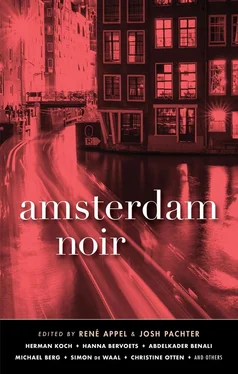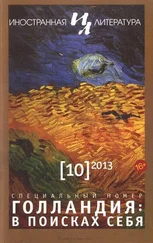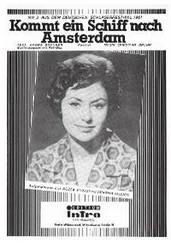Герман Кох - Amsterdam Noir
Здесь есть возможность читать онлайн «Герман Кох - Amsterdam Noir» весь текст электронной книги совершенно бесплатно (целиком полную версию без сокращений). В некоторых случаях можно слушать аудио, скачать через торрент в формате fb2 и присутствует краткое содержание. Город: New York, Год выпуска: 2018, ISBN: 2018, Издательство: Akashic Books, Жанр: Детектив, на английском языке. Описание произведения, (предисловие) а так же отзывы посетителей доступны на портале библиотеки ЛибКат.
- Название:Amsterdam Noir
- Автор:
- Издательство:Akashic Books
- Жанр:
- Год:2018
- Город:New York
- ISBN:978-1-61775-685-6
- Рейтинг книги:4 / 5. Голосов: 1
-
Избранное:Добавить в избранное
- Отзывы:
-
Ваша оценка:
- 80
- 1
- 2
- 3
- 4
- 5
Amsterdam Noir: краткое содержание, описание и аннотация
Предлагаем к чтению аннотацию, описание, краткое содержание или предисловие (зависит от того, что написал сам автор книги «Amsterdam Noir»). Если вы не нашли необходимую информацию о книге — напишите в комментариях, мы постараемся отыскать её.
Amsterdam Noir — читать онлайн бесплатно полную книгу (весь текст) целиком
Ниже представлен текст книги, разбитый по страницам. Система сохранения места последней прочитанной страницы, позволяет с удобством читать онлайн бесплатно книгу «Amsterdam Noir», без необходимости каждый раз заново искать на чём Вы остановились. Поставьте закладку, и сможете в любой момент перейти на страницу, на которой закончили чтение.
Интервал:
Закладка:
Sometimes, when they start bitching at me, I picture it in my mind: I’m lying on my bed and a guard says something about dirty laundry on the floor, making it sound like he’s my mother. Then I think about it. In my mind, I slide my hand under the mattress. He doesn’t have time to get away, maybe he starts screaming, maybe he doesn’t: I’m fast. Whatever the case, it’s too late. I’m finished before his colleagues can get there.
But I don’t do that. I won’t ever do it, either. As far as that goes, we’re all the same around here. Good behavior is the key thing we have in common. We do our little hand-washes, we borrow a book from the library, we play Ping-Pong and foosball like civilized individuals, pull some weeds in the herb garden. In any case, we never fight. We’re always conscious of the cameras, twenty-four hours a day. “Wasn’t that serve out?” we ask cautiously and, cool as can be of course, lay our paddles on the table. We look at each other. Staring down is what they call that. It’s about who has the steadiest eye, the most eloquent body language. But the security cameras don’t pick up a thing. “I think you’re right, it was out.” You make a mental note to do something later, in the showers or out in the yard, in a corner where there aren’t any cameras.
The serve wasn’t out, you know that — and he knows it too.
The first time he showed up at visiting hours was six months ago. A journalist, a big name in crime circles. Marc Verhoeven. He had a plan: a biography, the story of my life.
“We share the revenues,” Verhoeven told me then. “Everybody wants to read about you. I expect it’ll sell a quarter of a million copies.”
I was up for it. I didn’t have to tell him everything, nothing that would jeopardize my getting out of here three years from now.
“But I’ll need you to tell me a couple of things, of course,” he said. “Things people don’t know. Things they want to read about.” Then Verhoeven asked if I was okay with him interviewing my wife. “ Ex -wife,” he corrected himself right away. “To get a complete picture, I want to interview Chiara too. But not without your permission, of course. Not behind your back.”
I sensed something at the time, I don’t know exactly how to describe it: a dark cloud, people say sometimes, as in, “dark clouds gathered.” But what I sensed wasn’t so much dark as compact and odorless. A poisonous cloud from a chemical plant, the neighbors are warned to keep their doors and windows shut.
“She’s not my ex-wife,” I told him. “We’re only separated.”
“Okay, okay,” he said. “Have it your way. I mean, if you’d rather not have me interview her, just say so.”
Later on, I couldn’t help but laugh about that Not behind your back. All you could really say was that I had been too trusting. Looking back on it, if I had known then what was going to happen, that visiting hour would have gone differently. Would have ended differently, I should probably say.
You have those animal habitats at the zoo that look a little like an open cellblock. In fact, there are no bars. Just a moat with a wall on one side that the visitors can lean on, and the habitat itself is on the other side. A lot of trouble has been taken to reconstruct the animals’ natural surroundings: a couple of boulders have been brought in, there’s some sand, one or two trees that obviously aren’t native to these parts.
At the back of the habitat is where the animals lie — let’s assume we’re talking about predators here, but it could just as easily be zebras or chimpanzees — dozing in the shade. There’s not much movement, a couple of sparrows are pecking around for leftovers between the rocks, but it’s not enough to wake the predators from their afternoon nap. They — for the sake of argument we’re still assuming that we’re talking about mammals here: lions, tigers, bears — blink their eyes occasionally, as though they’re dreaming: a nice dream, perhaps; they’re back where they came from, Yellowstone Park, the forests of Madagascar, the rolling savannas of Kenya or Tanzania.
Then, suddenly, there is tumult. Somebody — perhaps only a child, a child who has escaped its parents’ attention for a few seconds — has clambered up onto the wall and then fallen into the moat. There are screams, mostly from the parents, but then other bystanders get involved in the general panic: they shout instructions at the child, conflicting instructions, one of them shouts this, the other shouts that. Swim! Run! Don’t move! The water is shallow, it only comes up to the child’s chest. A rope! A keeper! A ladder!
Then one of the predators — now we can come out and say it: this is the lions’ habitat — one of the lions opens an eye. What’s all the noise? he wonders. Can’t a lion get a little sleep in this habitat? What’s all that splashing around in the moat?
It’s the biggest lion, the male, the kind of lion we imagine when we think of a lion: from The Lion King , a Metro-Goldwyn-Mayer lion, a lion like the ones on a pouch of Samson rolling tobacco, with a huge mane around its head. Slowly it stretches, even more slowly it rises, one leg at a time, onto all fours; easy as can be, it wanders over to the moat to look at what all the fuss is about.
One of the last times he came to visit, about two weeks ago, that’s the way I looked at Marc Verhoeven: the way a lion would. We were both in the same space; just like the child in the moat, the journalist had found his way into the animals’ habitat. True, there was a guard standing at the door, but I’ve already told you: I’m fast, I can do it in a couple of seconds.
Right then and there, I knew. I’d known it for a long time already, of course, but now I knew for sure. I could smell it.
Like I was sniffing his underpants.
Yes, that’s what it was like, no two ways about it. I’d fished his underpants out of the laundry basket and sniffed at them — and I knew.
And now I could smell it, even without having his underpants in my hand. Later, lots of times, I asked myself how I was able to do that. And I think I know.
First of all, because of all the years of training on the outside . In my professional community, the sixth sense is more important than the other five. For survival . You have to be able to interpret a sound without actually hearing it: the window of a car parked in front of your house is rolled down, the safety on a pistol is slid back. You hit the ground before the shot is even fired. You survive.
And on the inside too, just as much. Without turning around, you know who comes into the showers right after you. Who’s moved up behind you in a flash. You slick back your hair under the hot spray from the showerhead, you keep your eyes closed and let the water splash against your eyelids — but within half a second, you turn. You yank the sharpened screwdriver out of the other person’s hand, in one move you break his wrist — and, if you’ve got enough time, all five of his fingers.
I listened to Verhoeven. For the umpteenth time, he asked me about my connections with this guy, with some other guy, about where I was when Edward G. got plugged behind the counter of his cigar store, about whether I had used different passports during my frequent trips to Thailand, Colombia, and my place on the Costa del Sol.
Yes, I listened, I nodded, and I answered, but meanwhile I breathed through my nose as much as possible. I stuck my nose out above the grassland of the savanna, nothing but my nose, the zebra foal wandering this way would never get to see my head, the cracking of its own vertebrae would be the last sound it heard in its short life, once I sank my teeth into it.
Читать дальшеИнтервал:
Закладка:
Похожие книги на «Amsterdam Noir»
Представляем Вашему вниманию похожие книги на «Amsterdam Noir» списком для выбора. Мы отобрали схожую по названию и смыслу литературу в надежде предоставить читателям больше вариантов отыскать новые, интересные, ещё непрочитанные произведения.
Обсуждение, отзывы о книге «Amsterdam Noir» и просто собственные мнения читателей. Оставьте ваши комментарии, напишите, что Вы думаете о произведении, его смысле или главных героях. Укажите что конкретно понравилось, а что нет, и почему Вы так считаете.












